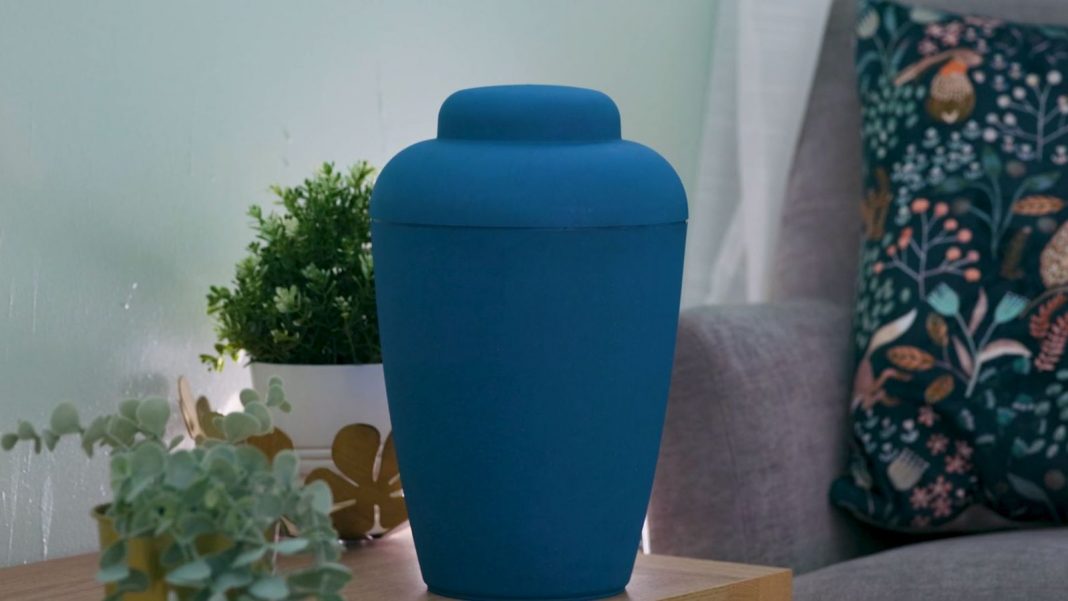Co-op Funeralcare has said it hopes to be able to offer water cremations in the UK for the first time later this year.
Currently there are only two options for families when their loved ones die – just under 80% choose traditional cremation and the remainder opt for a burial.
But amid concerns about the carbon footprint of gas-fired cremators and with extremely limited space for graves, cremating people in water is being suggested as a greener alternative.
How does it work?
Water cremation involves placing a person’s body in a sealable, biodegradable pouch, which is then put in a large steel water chamber.
The water is heated up to 160C (320F) but the pressure from the chamber stops it from boiling. At a ratio of 5% chemical to 95% water, a substance used to make soap called potassium (or sodium) hydroxide is added.
This causes the natural tissues and fats to dissolve, mimicking the process of natural decomposition when someone is buried – which takes up to 12 years.
Water cremation takes between four and 14 hours.
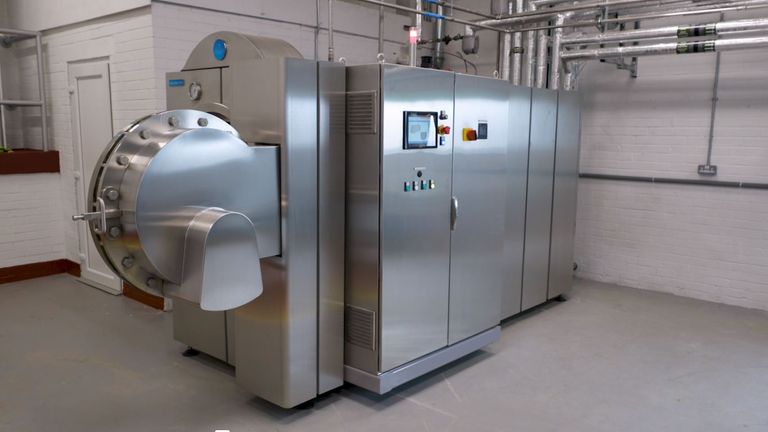
Resomation Ltd’s ‘Resomator’. Pic: Kindly Earth
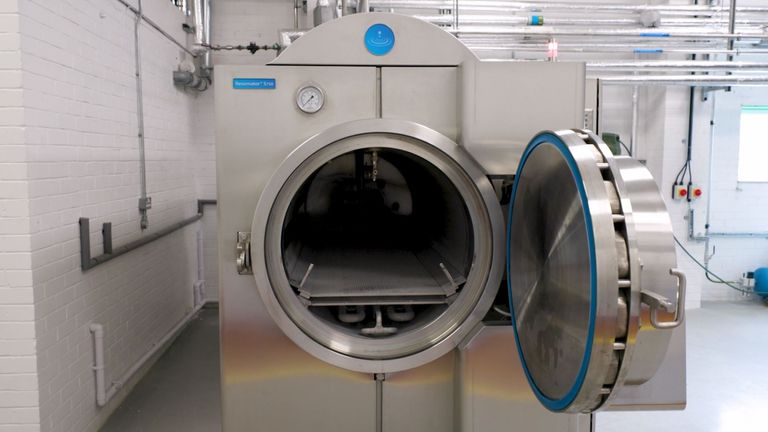
The body is placed inside this steel chamber. Pic: Kindly Earth
It does not destroy the person’s bones, which become pure calcium phosphate in the process and can be broken down into powder and scattered like ashes.
Any dental fillings or surgical implants will also be leftover.
If it’s not available in the UK – where is it used?
Water cremation is also known by its scientific name alkaline hydrolysis, hydrocremation, biocremation, or the brand names Resomation or aqua cremation.
Resomation is the most widely developed technology and was founded by the Scottish biochemist Sandy Sullivan who built the first ‘Resomator’ in the UK in 2009.
It’s also the quickest and takes four hours.
People in the UK can’t be water cremated, but Co-op Funeralcare has got the relevant local council and water board permissions to pilot it in a small number of places later this year.
Although Co-op hasn’t revealed where the pilots will be, Leeds-based Resomation Ltd has applied for permission to use its facilities commercially and another in Sandwell, West Midlands has been given the green light.
Previously water boards have objected to the leftover liquid contaminating the mains supply – but Mr Sullivan’s company has argued it is just natural proteins from the human body.
This content is provided by Spreaker, which may be using cookies and other technologies.
To show you this content, we need your permission to use cookies.
You can use the buttons below to amend your preferences to enable Spreaker cookies or to allow those cookies just once.
You can change your settings at any time via the Privacy Options.
Unfortunately we have been unable to verify if you have consented to Spreaker cookies.
To view this content you can use the button below to allow Spreaker cookies for this session only.
Click to subscribe to the Sky News Daily wherever you get your podcasts
Water cremation is legal in 28 US states and parts of Canada although it depends on funeral providers having the right equipment, which is expensive and costs around £300,000.
Australia, Mexico and the Netherlands are also gradually adopting it.
It was originally developed in the 19th century to dispose of animal bodies and rose to prominence again during the BSE (mad cow disease) epidemic of the 1980s and 1990s as an alternative to burning cow carcases.
In some parts of the world it’s used by private companies who conduct pet funerals and to dispose of bodies used for medical research.
Eco benefits
Although most people choose to cremate their loved ones, gas-fired furnaces are bad for the environment and expensive to run.
Embalming liquid used to preserve bodies also emits harmful chemicals – either into the atmosphere when they’re burned or into the soil when they’re buried.
Mercury is also produced when dental fillings are burned in traditional cremations.
Dr Kate Woodthorpe, a sociologist and director of the Centre for Death and Society at the University of Bath, tells Sky News: “We can’t keep going in the way we are.
“Relying on cemeteries that are full up and can’t generate any profit – and gas cremations that use up finite resources and are subject to volatile energy prices.”
The issue of space also stops those who can afford a burial because legislation that dates back to the Victorian period stops grave space being repurposed in most places outside of London, she adds.
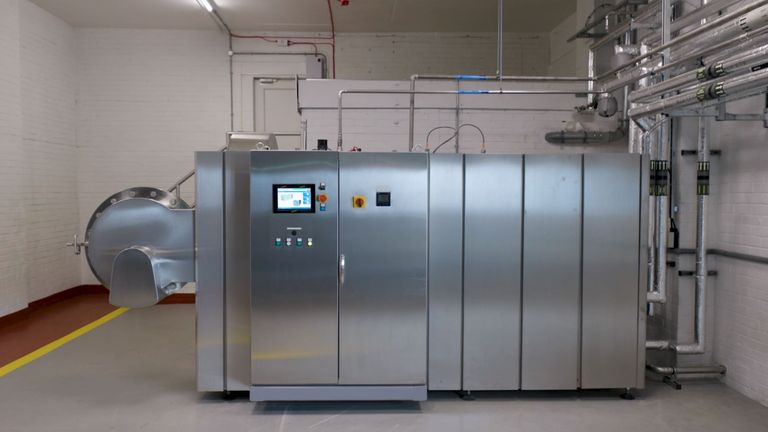
Pic: Kindly Earth
Read more from Sky News:
June was the hottest ever in the UK
How AI is helping puffins on a remote island
Analysis: Is the UK uninterested in the environment?
Helen Smith, chief commercial officer at Co-op Funeralcare, says a YouGov poll commissioned by the company shows that although 89% of adults hadn’t heard of water cremation – almost a third said they would choose it if it was available.
“There are two drivers of this,” she says. “Client choice and sustainability.”
“When we talk to families and people who are planning their own funerals, we’ve seen a real rise in people being driven by the environment.
“And as the Co-op, we’re really driven to meet our net zero target by 2040.”
Dr Woodthorpe adds that with many still struggling to talk openly about death, using water instead of fire could feel “more gentle”.
“Fire is quite an aggressive way to deal with disposing of someone’s body,” she says. “But water is plentiful and renewable.”
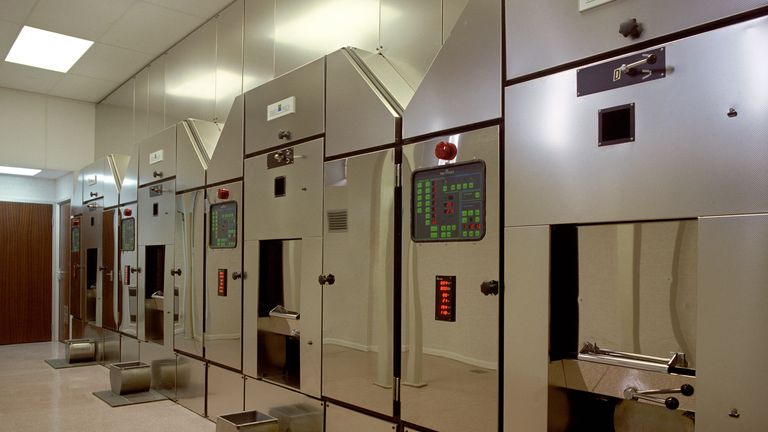
Traditional gas-fired cremators
Likely to stay ‘niche’ until it can be cost-efficient
The Co-op says that if its regional pilot is successful, “guided by the science” it hopes to offer water cremation at around the same cost as a traditional one.
But as they take longer than traditional ones, Dr Woodthorpe is sceptical that water cremations can be scaled up and made affordable.
“I think it’s really good we’re having the conversation about alternative methods, but I wonder if water is going to be the answer,” she says.
“These are essentially commercial issues for private companies and consumers.
“Local authorities will look at their options, but they need to guarantee a return on their investment.
“It’s an emerging option, but the cost is a very big one. So in that sense it’s probably going to be more affluent people who are driven by the environment – because they can afford to be.”
Co-op Funeralcare is working with at least one council on electric-operated cremators.
Woodland burial sites, a process known as ‘human composting’, and using eco-friendly coffins are all other green options under consideration – which could prove much cheaper than water cremation.
“I think unless they can make it cost-efficient, it might remain a niche market,” Dr Woodthorpe says.
But Ms Smith adds: “It’s all about testing the emissions of various methods. This is a pilot, but the industry needs to play its part in reaching net zero and we’re leading on that.”


